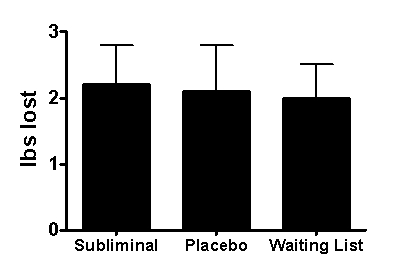Use the following to answer questions :
Scenario I
The scenario is based on and presents fabricated data consistent with the following study:
Merikle,P.M. ,& Skanes,H.E.(1992) .Subliminal self-help audiotapes: A search for placebo effects.Journal of Applied Psychology,77(5) ,772-776.doi:10.1037/0021-9010.77.5.772
Merikle and Skanes (1992) investigated the effectiveness of subliminal self-help audiotapes to promote weight loss in overweight females seeking to lose weight.Participants were randomly assigned to groups.Participants in two groups were instructed to listen to audiotapes containing subliminal messages associated with weight loss daily.Group 1 (the subliminal group) actually received these tapes.Group 2 (the placebo group) received tapes containing subliminal messages associated with relieving dental anxiety.Finally,a third group of participants was not given audiotapes and was told that they were on a waiting list to participate in the study.All participants-including the participants on the waiting list-were weighed weekly for 5 weeks.The average total weight loss (and standard deviations) for the three groups after the fifth week is presented in Figure 5.1.
Figure 5.1 
-(Scenario I) Suppose that a company markets a subliminal audiotape designed for people wanting to lose weight.As evidence that the product is effective,it cites a study based on 500 randomly selected overweight participants demonstrating that people who listened to the tapes for 10 weeks lost-on average-6 pounds.Which statement is NOT a reason to be sceptical of these claims?
Definitions:
Analytic Intelligence
One aspect of human intelligence that involves the ability to analyze, evaluate, judge, compare, and contrast information.
Intuitive
Referring to understanding or knowing something instinctively, without the need for conscious reasoning.
Strategic
refers to the careful planning and management of resources to achieve a specific goal or to gain an advantage.
Fluid Intelligence
The capacity to reason quickly and think abstractly, enabling problem solving and learning in novel situations.
Q11: A mother scolds her teenage son to
Q63: Explicit memories can affect our current behaviour,even
Q148: Which scenario BEST illustrates déjà vu?<br>A)suddenly believing
Q161: A psychology professor perceives that his pants
Q219: The majority of Canadians aged 15 and
Q222: When we remember something,our brains create exact
Q286: In correct chronological order,we encode,retrieve,and store memories.
Q316: Modern _ theories postulate that the brain
Q359: Which researcher studied memory by using nonsense
Q389: Neurotransmission between two neurons physically changes the